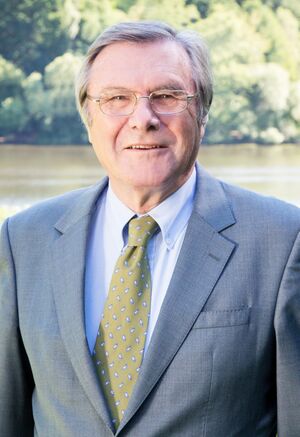Wolfgang Gerhardt
( politician) | |
|---|---|
 | |
| Born | 1943-12-31 Hesse, Germany |
| Nationality | German |
| Alma mater | University of Marburg |
| Member of | Friedrich Naumann Foundation, Trilateral Commission |
| Party | Free Democratic Party |
Wolfgang Gerhardt (born 31 December 1943) is a German politician and was the leader of the Free Democratic Party of Germany (FDP) from 1995 until he was succeeded by Guido Westerwelle in 2001.[1]
Contents
Education and Profession
After graduating from the Albert-Schweitzer-Schule Alsfeld in 1963, Gerhardt studied education, German and politics at the University of Marburg from 1963 to 1969. In 1970 he received his doctorate there on the educational policy of the FDP after 1945 under Leonhard Froese. From 1969 he worked at the Friedrich Naumann Foundation, initially as head of the regional office in Hanover, then as a consultant in the domestic department. In 1971 he moved to the Hessian Ministry of the Interior as personal advisor to Minister Hanns-Heinz Bielefeld, where he headed the ministerial office under Bielefeld's successor Ekkehard Gries until he moved into the state parliament.
Political career
He was a member of the Member of the Landtag of Hesse from 1978 until 1994. Between 1987 and 1991, he served as State Minister for Science and Culture and Deputy Minister-President in the state government of Minister-President Walter Wallmann of Hesse. In this capacity, he was one of the state's representatives on the Bundesrat.
From 2002 until 2012, Gerhardt was Vice President of Liberal International (LI), under the leadership of successive presidents Annemie Neyts-Uyttebroeck (2002–2005), John Alderdice (2005–2009), and Hans van Baalen (2009–2011).
Ahead of the 2005 national elections, Gerhard was billed as a possible foreign minister in a new centre-right coalition with the Christian Democrats; instead, newly elected Chancellor Angela Merkel entered a coalition with the Social Democratic Party.[2] Gerhardt was succeeded as chairman of the FDP parliamentary group by Westerwelle in 2006. Between 2006 and 2013, he served on the Committee on Foreign Affairs.
Since 2006, Gerhardt has been serving as chairman of the board of the Friedrich Naumann Foundation.
Other activities
Corporate boards
- Alte Leipziger Lebensversicherung aG, Member of the Advisory Board
- Hallesche-Nationale Krankenversicherung aG, Member of the Advisory Board
- Rücker AG, Member of the Supervisory Board
- Deutsche Vermögensberatung (DVAG), Member of the Advisory Board (1995)[3]
Non-profits
- Theodor Heuss House, Chairman of the Board of Trustees
- Max Planck Institute for Heart and Lung Research, Member of the Board of Trustees[4]
- German Association for Small and Medium-Sized Businesses (BVMW), Member of the Political Advisory Board
- Memorial to the Murdered Jews of Europe, Member of the Advisory Board
- German Institute for International and Security Affairs (SWP), Member of the Council (2005–2013)
- Turkey: Culture of Change Initiative (TCCI), Member of the Advisory Board[5]
Events Participated in
| Event | Start | End | Location(s) | Description |
|---|---|---|---|---|
| Munich Security Conference/2009 | 2009 | 2009 | Germany Munich Bavaria | The 45th Munich Security Conference |
| Munich Security Conference/2012 | 3 February 2012 | 5 February 2012 | Germany Munich Bavaria | The 48th Munich Security Conference |
| Munich Security Conference/2013 | 1 February 2013 | 3 February 2013 | Germany Munich Bavaria | The 49th Munich Security Conference |
References
- ↑ https://web.archive.org/web/20131030085552/http://www.bundestag.de/bundestag/abgeordnete17/biografien/G/gerhardt_wolfgang.html
- ↑ Bertrand Benoit and Edward Alden (28 June 2005), Schröder attempts to sway US on claim for UN seat Financial Times.
- ↑ Tobias Romberg (19 May 2011), Ritter der Schwafelrunde Die Zeit.
- ↑ Board of Trustees Max Planck Institute for Heart and Lung Research.
- ↑ Advisory Board Turkey: Culture of Change Initiative (TCCI).